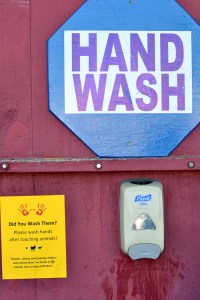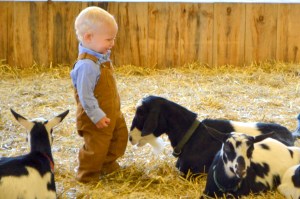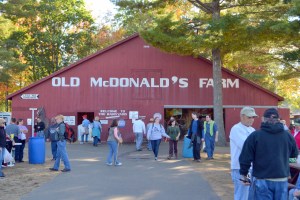FRYEBURG — There were new, bright yellow signs on Old McDonald’s Farm on Wednesday morning, reminding Fryeburg Fair visitors at the popular petting zoo to wash their hands after touching animals.
The signs were a direct result of news Tuesday of a possible connection between the petting zoo at the Oxford County Fair in Oxford last month and the death of 20-month-old Colton Guay of Poland on Monday.
According to Colton’s father, Jon Guay, the boy may have contracted HUS, or hemolytic uremic syndrome, after being exposed to E. coli bacteria while petting farm animals at the fair. Another boy who visited the same petting zoo, 17-month-old Myles Herschaft of Auburn, is still battling a case of HUS, according a Facebook post made by his father, Victor, on Tuesday.
Despite the signs and instructions to wash hands given by the attendant at Old McDonald’s Farm as families left the barnyard, many visitors Wednesday morning walked by the hand sanitizing stations on the building. Several of those who did heed the warnings paused to consider the reasons, commenting to each other on the recent tragedy and possible causes that claimed the young Poland boy’s life.
“Touching an animal, especially at McDonald’s Farm, is part of the whole fair experience. It would be unfortunate to take that away from the young fairgoers,” Fryeburg Fair Superintendent David Andrews said Wednesday.
For years, Andrews said, there have been hand sanitizing stations at the doors of every barn at Maine’s largest agricultural fair. He said the fair staff are constantly refilling the stations to help ensure the safety of visitors.
While officials have yet to confirm that the particular E.coli bacteria the young Androscoggin County boys were exposed to did, in fact, come from the petting zoo area at the Oxford County Fair, Fryeburg Fair officials decided to be proactive upon hearing the news. They held meetings Tuesday evening and Wednesday to discuss the situation.
Fryeburg Fair officials said Tuesday that the animals at their petting zoo are not the same ones that were at the Oxford County Fair.
Already, keeping people and other animals safe at the fair is a priority, and the Fryeburg Fair has a longstanding policy for maintaining safety standards, Andrews said.
All animals are checked upon arrival at the fair, and the veterinarians have authority to turn an animal away or to send an animal home if they believe it to be in less than stellar health, fair veterinarian Mark Anderson, DVM, said.
Even if the E. coli strain in question did not come from animals at the Oxford County Fair, the possibility alone is a reminder that there are precautions everyone can take to help prevent further tragedy, he said.
“This is a sign that we need to be more vigilant in getting the public to be more careful,” the veterinarian said. “The yellow signs went up yesterday after we met to talk about what more we can do,” he said.
E. coli is a naturally occurring bacteria, according to Anderson. It can live in the intestines of farm animals such as goats, sheep, horses and cows. The animal’s own immune systems are generally strong enough to keep the bacteria in check. However, Anderson said, if an animal becomes stressed, then they begin to shed that E. coli, and that is when the situation has the potential to become serious.
What constitutes as “stress” to animals varies from group to group, he said. Even the weather can cause stress to certain animals in certain situations. Whether petting zoo animals are under more stress than normal remains a question to be answered, but Anderson said if it were a common problem, then there would be more frequent reports of such incidents.
“The hard thing for us is that we don’t have a screening tool,” Anderson said. “Obviously, those goats are more stressed than they would be in their home environment, but this is a rare event.”
Last year, Anderson’s 14-year-old son experienced complications from exposure to the same toxic strain of E. coli as the Androscoggin County boys. He survived the illness, but experienced diarrhea and severe stomach cramps for several days, eventually ending up at the hospital for treatment.
Anderson said the difference between a 14-year-old’s immune system and that of a young baby or toddler can affect the individual’s ability to survive exposure to potentially deadly E. coli bacteria. In his son’s case, he’s unsure whether the contamination came from one of his own animals, one of the animals he was treating as part of his veterinary practice during that time or even from some other contaminant not connected to his New Hampshire farm and practice.
Even with his personal experience with E. coli, and hearing of the two recent cases, Anderson said it’s extremely rare. In all the farms he visits annually as part of his practice, he said, he seldom hears of people falling sick because of exposure to the bacteria.
Jeanie Lewis of Maple Row Farm in Auburn brought some of her dairy cows and her two children, ages 1 and 4, to the Fryeburg Fair this year. She said she grew up on a farm, and her children are always on the farm with her. Her daughter even spends summers running around the farm barefoot.
She said she is unconcerned about E. coli, recognizing how rare it is, and worries people may panic unnecessarily if a link is found between the bacteria and the petting zoo at the Oxford County Fair.
“I think before everyone goes on red alert, they should find out what the link is,” she said.
Her children have been around farm animals since they were babies, she said. She wondered if they might have built a natural tolerance to E. coli by spending so much time in an farm environment.
“I know what our animals are fed and how they’re cared for, and I feel comfortable letting my kids be around it,” Lewis said.
Anderson said visitors to petting zoos at any fair or farm can stay safe by completing one simple action after interacting with the animals.
“The biggest thing is that the kids wash their hands after feeding and petting these baby goats and animals,” the veterinarian said.
Andrews agreed, saying the farm has provided hand sanitizing stations and a washroom to the right of Old McDonald’s Farm. With the addition of the signs urging hand washing, and with the continuation of the petting zoo attendant urging handwashing, he said it’s time for people to take personal responsibility for their safety.
“As far as we can see, we’re doing everything we can. People need to take it upon themselves to use good judgment and wash their hands. We’ve furnished them with the facilities,” Andrews said.
More coverage:
- CDC officials say bacteria ID will take time
- Auburn boy still battling E. coli complications
- Obituary: Colton James-Brian Guay



Comments are no longer available on this story